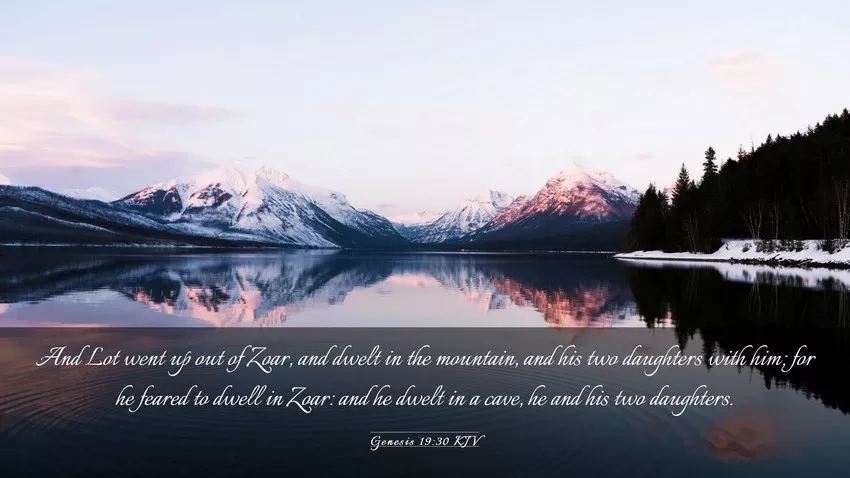Read the Daily Bible Verse – Genesis 19:30 To Strengthen Your Spiritual Journey.
Genesis 19:30 is a perplexing and often unsettling verse in the Bible. This passage occurs within a broader narrative that includes the destruction of Sodom and Gomorrah and the escape of Lot and his daughters. The verse reads: “And Lot went up out of Zoar, and dwelt in the mountain, and his two daughters with him; for he feared to dwell in Zoar: and he dwelt in a cave, he and his two daughters.” To fully understand this verse, it is crucial to examine its context, meaning, applications, and relevance. This article aims to provide a detailed analysis of Genesis 19:30, exploring its implications and significance for both ancient and modern audiences.
The Context of Genesis 19:30 KJV
To comprehend Genesis 19:30, we must first understand its context within the larger narrative of Genesis 19. This chapter describes the events following the destruction of Sodom and Gomorrah, cities known for their wickedness. Lot, Abraham’s nephew, and his family are the sole survivors of these cities, having been warned by angels to flee before the divine judgment.
The chapter unfolds as follows:
Destruction of Sodom and Gomorrah: God rained fire and brimstone on these cities due to their grievous sins (Genesis 19:24-25).
Lot’s Escape: Lot and his daughters flee to the small town of Zoar after initially being warned to escape to the mountains (Genesis 19:22).
Fear and Relocation: Fearing for their safety in Zoar, Lot and his daughters abandon the town and retreat to a cave in the mountains (Genesis 19:30).
Genesis 19:30 thus occurs after the destruction of the cities but before the infamous actions of Lot’s daughters. The verse sets the stage for subsequent events, including the daughters’ troubling decision to continue their family line.
The Genesis 19:30 Meaning
Genesis 19:30 describes Lot and his daughters living in a cave, away from civilization, due to fear of residing in Zoar. This fear prompts their move to the mountains, a location deemed safer. The simplicity of the verse masks deeper implications:
Fear and Isolation: Lot’s decision to move to a cave signifies a retreat from the dangers he perceives in Zoar. The cave represents a place of isolation and desperation, contrasting sharply with the previous towns and cities.
Thematic Transition: This verse transitions into the more troubling narrative of Lot’s daughters, who, in an attempt to preserve their family line, engage in incestuous behavior. The isolation and fear Lot experiences symbolize a state of moral and social disarray, setting the scene for the ensuing troubling actions.
See Also: What Does Genesis 19:29 Mean?
Genesis 19:30 Application in Life
Genesis 19:30 provides several lessons applicable to modern readers:
Facing Fears: Lot’s decision to relocate reflects a common human reaction to fear. It encourages readers to consider how fear influences their decisions and the extent to which they might avoid confronting their problems directly.
Seeking Safety: The verse underscores the importance of finding safety and security, both physically and emotionally. It prompts individuals to reflect on their own fears and the measures they take to ensure their well-being.
Moral Choices: The eventual actions of Lot’s daughters highlight the impact of fear and isolation on moral decision-making. It serves as a cautionary tale about the consequences of extreme fear and isolation on ethical behavior.
Comparison with Other Biblical Texts
To gain a fuller understanding of Genesis 19:30, it is helpful to compare it with other Biblical passages:
Genesis 12:10-20: In this earlier narrative, Abram (later Abraham) also faces fear and makes a questionable decision to deceive Pharaoh about Sarai being his sister. Both narratives involve fear leading to actions that have significant consequences.
Genesis 39:11-20: The story of Joseph and Potiphar’s wife reflects the theme of moral integrity under pressure. Unlike Lot’s daughters, Joseph chooses to maintain his moral principles despite facing severe consequences.
Psalm 46:1: Contrasting the fear in Genesis 19:30, Psalm 46:1 states, “God is our refuge and strength, a very present help in trouble.” This verse suggests a reliance on divine protection rather than retreating into isolation.
Modern-Day Relevance
Genesis 19:30 remains relevant in today’s context, especially regarding themes of fear, isolation, and decision-making:
Mental Health: The fear and isolation experienced by Lot can be seen as metaphorical for modern mental health struggles. It reflects how fear can lead individuals to isolate themselves and make decisions driven by anxiety.
Ethical Decisions: The consequences of Lot’s daughters’ actions serve as a reminder of the importance of ethical decision-making and the potential pitfalls of acting out of fear or desperation.
Resilience: The verse prompts reflection on how individuals and communities respond to crises and whether their responses lead to constructive or destructive outcomes.
Conclusion
Genesis 19:30 is a powerful verse that highlights themes of fear, isolation, and moral decision-making. Understanding its context, meaning, and applications provides valuable insights into both ancient and modern human experiences. By comparing it with other Biblical texts and reflecting on its relevance today, readers can gain a deeper appreciation for its lessons and implications. The verse challenges us to confront our fears, make ethical choices, and seek safety without succumbing to isolation or desperation.
Genesis 19:30 Commentary
In the commentary on Genesis 19:30, scholars often explore the implications of Lot’s actions and the broader narrative context. They highlight the thematic elements of fear and moral decay, noting that the cave symbolizes a retreat into a more primitive and less civilized state. This commentary frequently emphasizes the transition from fear-driven decisions to the morally questionable actions of Lot’s daughters, suggesting that extreme fear and isolation can lead to significant ethical lapses. The verse serves as a poignant reminder of the complex interplay between fear, decision-making, and moral behavior in the Biblical narrative.


